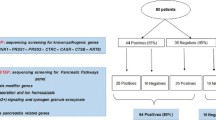Conclusion
The pathogenesis of chronic pancreatitis is still not completely understood. However, recent advances in cellular and molecular biology have revealed complex interactions between in.ammatory cells and pancreatic parenchyma cells, as well as alterations in nerves. Furthermore, as a result of novel technologies, it has become possible to identify key genes in the disease process of chronic pancreatitis. Tryptase,15 CRISP3,16 and COMP17 are three of the candidate genes that may serve as disease markers and therapeutic targets in the future. Further molecular and cell biology studies will increase our knowledge of the pathogenesis and pathophysiology of this disease, hopefully resulting in better diagnostic and therapeutic modalities in the future.
Similar content being viewed by others
References
Adler G, Schmid RM. Chronic pancreatitis: Still puzzling? Gastroenterology 1997;112:1762–1765.
KleeffJ, Friess H, Korc M, Buchler MW. Chronic pancreatitis: Pathogenesis and molecular aspects. Ann Ital Chir 2000; 71:3–10.
Whitcomb DC, Gorry MC, Preston RA, Furey W, Sossenheimer MJ, Ulrich CD, Martin SP, Gates LK Jr, Amann ST, Toskes PP, Liddle R, McGrath K, Uomo G, Post JC, Ehrlich GD. Hereditary pancreatitis is caused by a mutation in the cationic trypsinogen gene. Nat Genet 1996; 14:141–145.
Witt H, Luck W, Hennies HC, Classen M, Kage A, Lass U, Landt O, Becker M. Mutations in the gene encoding the serine protease inhibitor, Kazal type 1 are associated with chronic pancreatitis. Nat Genet 2000;25:213–216.
Sharer N, Schwarz M, Malone G, Howarth A, Painter J, Super M, Braganza J. Mutations of the cystic fibrosis gene in patients with chronic pancreatitis. N Engl J Med 1998; 339:645–652.
Bockman DE, Buchler M, Malfertheiner P, Beger HG. Analysis of nerves in chronic pancreatitis. Gastroenterology 1988; 94:1459–1469.
Buchler M, Weihe E, Friess H, Malfertheiner P, Bockman E, Muller S, Nohr D, Beger HG. Changes in peptidergic innervation in chronic pancreatitis. Pancreas 1992;7:183–92.
Hunger RE, Mueller C, Z’Graggen K, Friess H, Buchler MW. Cytotoxic cells are activated in cellular infiltrates of alcoholic chronic pancreatitis. Gastroenterology 1997;112:1656–1663.
Di Sebastiano P, Fink T, Weihe E, Friess H, Innocenti P, Beger HG, Buchler MW. Immune cell infiltration and growth-associated protein 43 expression correlate with pain in chronic pancreatitis. Gastroenterology 1997;112:1648–1655.
Saurer L, Reber P, Schaffner T, Buchler MW, Buri C, Kappeler A, Walz A, Friess H, Mueller C. Differential expression of chemokines in normal pancreas and in chronic pancreatitis. Gastroenterology 2000; 118:356–367.
Goecke H, Forssmann U, Uguccioni M, Friess H, Conejo- GarciaJR, Zimmermann A, BaggioliniM, Buchler MW. Macrophages infiltrating the tissue in chronic pancreatitis express the chemokine receptor CCR5. Surgery 2000;128:806–814.
Friess H, Zhu ZW, di Mola FF, Kulli C, Graber HU, AndrenSandberg A, Zimmermann A, Korc M, Reinshagen M, Buchler MW. Nerve growth factor and its high-affinity receptor in chronic pancreatitis. Ann Surg 1999;230:615–624.
Venter JC, Adams MD, Myers EW, et al. The sequence of the human genome. Science 2001;291:1304–1351.
Friess H, Ding J, KleeffJ, Liao Q, Berberat PO, Hammer J, Buchler MW. Identification of disease-specific genes in chronic pancreatitis using DNA array technology. Ann Surg 2001;234:769–778; discussion 778–779.
Esposito I, Friess H, Kappeler A, Shrikhande S, Kleeff J, Ramesh H, Zimmermann A, Buchler MW. Mast cell distribution and activation in chronic pancreatitis. Hum Pathol 2001;32:1174–1183.
Liao Q, Kleeff J, Xiao Y, Guweidhi A, Schambony A, TopferPetersen E, Zimmermann A, Buchler MW, Friess H. Preferential expression of cystein-rich secretory protein-3 (CRISP-3) in chronic pancreatitis. Histol Histopathol 2003;18:425–433.
Liao Q, KleeffJ, Xiao Y, Di Cesare PE, KorcM, Zimmermann A, Buchler MW, Friess H. COMP is selectively up-regulated in degenerating acinar cells in chronic pancreatitis and in chronicpancreatitis-like lesions in pancreatic cancer. Scand J Gastroenterol 2003;38:207–215.
Author information
Authors and Affiliations
Corresponding author
Rights and permissions
About this article
Cite this article
Friess, H., Kleeff, J. & Büchler, M.W. Molecular pathophysiology of chronic pancreatitis—an update. J Gastrointest Surg 7, 943–945 (2003). https://doi.org/10.1016/j.gassur.2003.10.002
Issue Date:
DOI: https://doi.org/10.1016/j.gassur.2003.10.002




